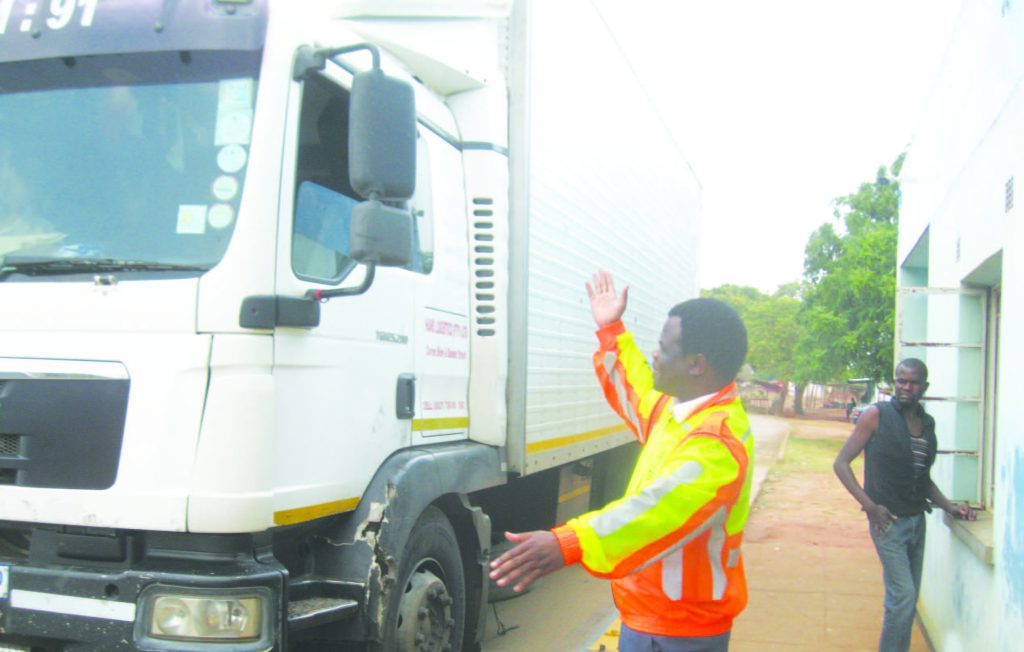Overloaded and blown to bits
Every day, Malawi receives truckloads of petroleum and other goods that keep the economy running.
However, the trucks that haul the vital imports have been blamed for shattering the landlocked country’s roads since the decay of rail and water transport systems.

Overloaded cross-border trucks go unchecked despite the presence of weighbridges at border points and at designated places on main roads.
Malawians in roadside communities near borders with Zambia, Tanzania and Mozambique say incoming trucks are the worst culprits.
Songwe in Karonga District, the gateway to Tanzania, is Malawi’s busiest border post after Mwanza which links Malawi to Mozambique, Zimbabwe and South Africa. Every day, some 80 to 100 trucks cross into Malawi, hauling imports from the Indian Ocean coastal port of Dar es Salaam in Tanzania.
Songwe Border Post station manager Petros Mohammed reckons that international operators rarely overload due to strict scrutiny in east Africa.
There are weighbridges at Songwe, Mwanza, Mchinji and Muloza in Mulanje.
Cargo trucks on the roads of Malawi are supposed to be weighed at Balaka and Dedza as well as semi-permanent scales at Lirangwe in Blantyre and mobile weighbridges.
However, there is no weighbridge between Karonga and the capital city, Lilongwe, the hugely potholed 573-kilometre stretch of the M1.
According to regional road traffic officer (North) Leonard Mtonya, unregulated overloading leaves the Northern Corridor shattered.
Ministry of Transport and Public Works deputy director Kelvin Mphonda says: “Overloading greatly shortens the lifespan of our roads.
“Just as vehicles, roads are designed to carry specific loads. Overloading damages the vehicle and layers of the road.”
To close the gap, the Directorate of Road Traffic and Safety Services (DRTSS) randomly mounts movable weighbridges as a stop-gap.
DRTSS officials also visit loading points for local trucks to sensitise drivers to the dangers of exceeding a vehicle’s capacity.
The department plans to construct a permanent weighbridge at Bwengu in Mzimba while another is under construction on the M5 in Nkhotakota.
Despite multi-billion kwacha investment in road upgrades, a 2014 survey found that only 41 percent of the country’s road network was in good condition. Some 17 percent was in a poor state, the findings show.
Malawi has about 5 000 kilometres of paved roads and over half require rehabilitation.
“Most paved roads have a design life of 20 years, but you will agree with me that the majority of our roads are over 20 years old. We need to increase our investments in road rehabilitation to preserve most of our paved roads,” he states.
In some cases, heavy trucks illegally use routes designated for lighter vehicles to evade weighbridges.
“Vehicles passing through the Malawi-Zambia border easily avoid the weighbridge diverting through uncharted routes,” says Mchinji Border Post station manager Richard Sochera.
He suggests the deployment of drones or relocation of a weighbridge to Chitipi in Lilongwe to detect illegal traffic crossing the porous border.
His Balaka counterpart George Wilson Magaleta says motorists who overload evade the weighbridge near Chingeni Junction through Manjawira-Nsipe earth road.
“Officers at our weighbridge have difficulties accessing this route due to lack of strong vehicles,” he says.
Balaka weighbridge staff have since agreed with villagers to inform them of any loaded truck using the earth roads.
“We give them airtime and they phone us once or twice a week. We go to impound and divert the truck, but sometimes we are slow because we only have a saloon. Our off-road vehicle, a Toyota Hilux, was involved in an accident,” Magaleta explains.
The Balaka weighbridge system is not connected to the automated Malawi Traffic Information System (Maltis), thereby limiting its operations.
Maltis has not only eased the registration and licensing of motor vehicles in the country but also tracking motor vehicles which contravene traffic laws.
“We would love to be connected to Maltis. We need to know if all vehicles that pass through the weighbridge have valid documents, an outstanding penalty or an arrangement to pay by instalment,” Magaleta explains.
Excess loading also increases the carnage on the accident-prone roads, reducing the lifespan of travellers and vehicles.
Overloading threatens the vehicle’s braking system and increases breakdowns, hindering the free flow of traffic.
However, the Ministry of Transport and Public Works has not yet established the financial cost of overloading, but Mphonda knows it is partly to blame for the new roads fast-breaking to pits.





